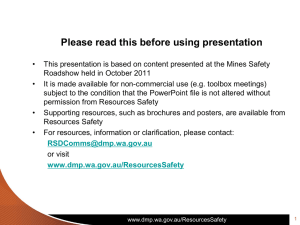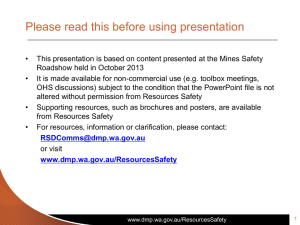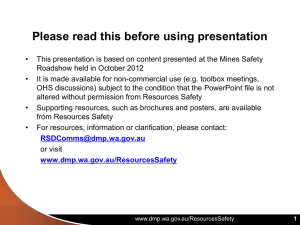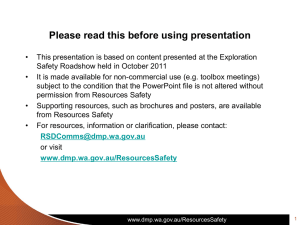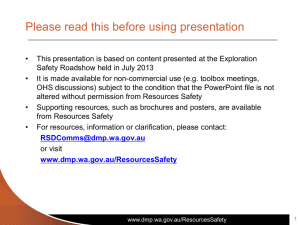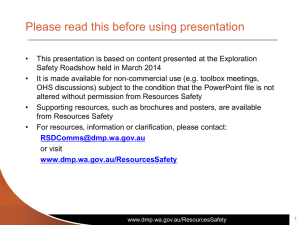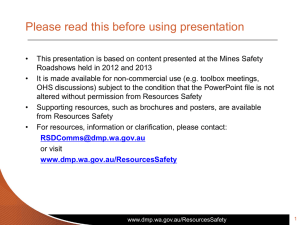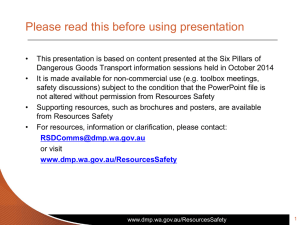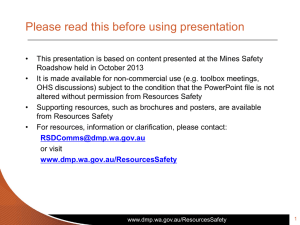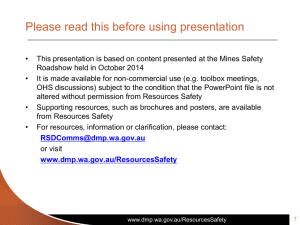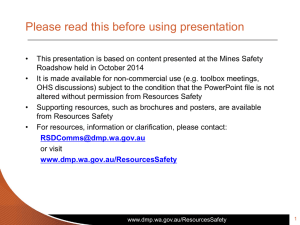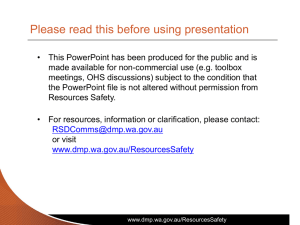- Australian Drilling Industry Association
advertisement
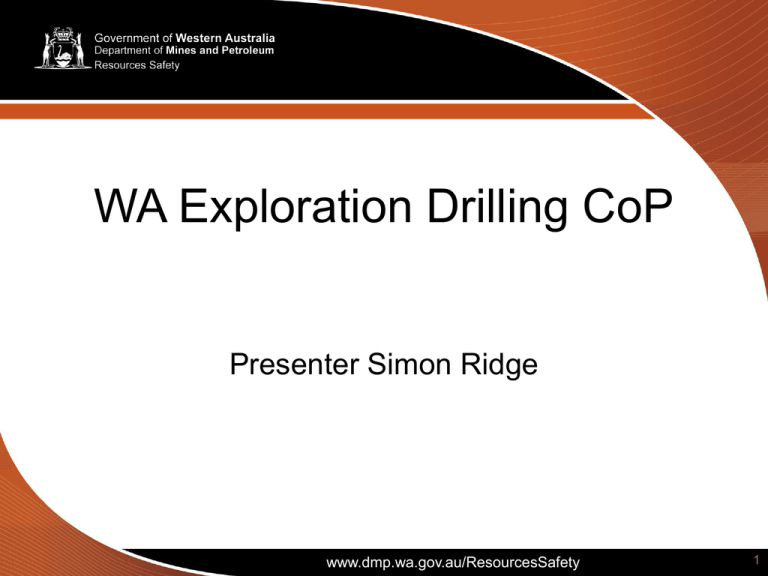
WA Exploration Drilling CoP Presenter Simon Ridge www.dmp.wa.gov.au/ResourcesSafety 1 What is in it for the exploration drilling sector? A commitment to working with the sector to reduce serious accidents and incidents, and tangible support in achieving a positive cultural change. www.dmp.wa.gov.au/ResourcesSafety 2 What’s happening with serious injuries? Number of serious injuries per million hours worked 6 5 4 3 2 1 0 1994-95 1998-99 2002-03 2006-07 www.dmp.wa.gov.au/ResourcesSafety 2010-11 3 Safety culture spectrum Vulnerable Rule followers Robust Enlightened In denial Deal ‘by the book’ Messengers ‘shot’ Conform to rules Develop risk management capacity Whistleblowers dismissed or discredited Target = ‘zero’ Enhance systems Safety management plan widely known Reactive Improve suite of performance measures Competent people with experience Develop action plans Accountabilities understood Actively seek new ideas Advanced performance measures Messengers rewarded Protection of the powerful Information hoarded Responsibility shirked Failure punished or covered up Repair not reform Information neglected Responsibility compartmentalised New ideas = ‘problems’ Monitor and review progress Clarify/refine objectives New ideas crushed Active leadership Resilient Strive for resilience of systems Reform rather than repair Responsibility shared Regular reviews Proactive as well as reactive Range of emergency responses catered for Failures prompt farreaching inquiries Flexibility of operation Consistent mindset is ‘wariness’ ‘in disarray’ pathological ‘organised’ reactive Sanction Direct ‘credible’ calculative ‘trusting’ proactive Encourage Partner www.dmp.wa.gov.au/ResourcesSafety ‘disciplined’ generative Champion 4 What about national harmonisation? Safe Work Australia National Mines Safety Framework Promote and expand the role of risk management • Less reliance on detailed prescription in regulations • Operators will be required to demonstrate an understanding of the hazards and risks that apply to their sites • Operators must eliminate risks or demonstrate effective controls www.dmp.wa.gov.au/ResourcesSafety 5 PHMPs for exploration? www.dmp.wa.gov.au/ResourcesSafety How has the code been developed? • Targeted at mineral exploration drilling in remote locations • Developed with industry input from various sources – Working and focus groups – 2010 and 2011 Exploration Safety Road Shows – Industry comment sought early 2012 – ADIA Sundowner March 2012 • Designed for ease of use and risk-based approach • Submission for national consideration www.dmp.wa.gov.au/ResourcesSafety What does industry consider to be significant? Promote a risk management approach for the guarding of machinery Implement the OHS compliance strategy for mineral exploration and drilling Promote the use of traffic management and confined space audits Raise awareness of seismicity issues and their potential consequences for underground mines Empower safety and health representatives www.dmp.wa.gov.au/ResourcesSafety 8 What does industry consider to be critical? Support the advancement of a resilient OHS culture in mining Promote the appropriate use of risk management tools Ensure mines address OHS issues associated with the construction phase of mining operations Facilitate the introduction of principal hazard management plans (PHMPs) www.dmp.wa.gov.au/ResourcesSafety 9 What other important issues did industry identify? Fatigue and working hours Alcohol and other drugs Workplace culture is about safety rather than production focussed Management and supervision More training (for new workers, contractors, supervisors, SHReps) and a higher standard of training Vehicle and equipment management and maintenance www.dmp.wa.gov.au/ResourcesSafety 10 Mineral exploration drilling – draft code Part 1 Risk management approach Part 2 Drilling hazards Part 3 Emergency preparedness www.dmp.wa.gov.au/ResourcesSafety 11 Is the risk adequately controlled? www.dmp.wa.gov.au/ResourcesSafety 12 What’s involved in risk management? www.dmp.wa.gov.au/ResourcesSafety 13 Risk management process www.dmp.wa.gov.au/ResourcesSafety 14 Consider the hierarchy of controls Elimination – remove the hazard by designing it out Substitution – replace the hazardous design component with a less hazardous one Most effective Isolation – separate the hazard from people involved in the work and those in general work area Engineering controls – built into design of plant, equipment or process to reduce exposure to hazard • Administrative controls – work practices such as procedures and training • PPE What works? www.dmp.wa.gov.au/ResourcesSafety 15 What is in it? Part 2 Drilling hazards • • • • • • • • • • Rotating and moving parts Compressed air systems Hydraulic systems Hazardous substances and dangerous goods Electricity Manual tasks Working at height Falling objects Working in hot environments Fatigue and mental wellbeing www.dmp.wa.gov.au/ResourcesSafety 16 What is in it? (continued) Part 2 Drilling hazards • • • • • • • • • • • Dust Noise Ionising radiation Hot work Extreme weather and bushfires Light vehicle movement Rig movement Remoteness of exploration Natural gases Existing workings Housekeeping www.dmp.wa.gov.au/ResourcesSafety 17 When will the code be available? • Approvals process – MIAC endorsement (September?) – Ministerial approval (October?) – Published online within 48 hours – Hard copy available within 2 weeks www.dmp.wa.gov.au/ResourcesSafety
